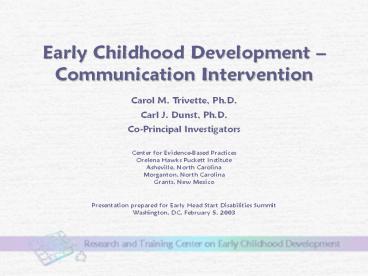Early Childhood Development - PowerPoint PPT Presentation
1 / 16
Title:
Early Childhood Development
Description:
Develop practice guides that parents and practitioners can use to implement ... to-practice studies of the usefulness and effectiveness of the practice guides. ... – PowerPoint PPT presentation
Number of Views:1610
Avg rating:3.0/5.0
Title: Early Childhood Development
1
Early Childhood Development Communication
Intervention
Carol M. Trivette, Ph.D. Carl J. Dunst,
Ph.D. Co-Principal Investigators Center for
Evidence-Based Practices Orelena Hawks Puckett
Institute Asheville, North Carolina Morganton,
North Carolina Grants, New Mexico Presentation
prepared for Early Head Start Disabilities
Summit Washington, DC, February 5, 2003
2
Purpose of the Presentation
- Describe the goals, activities, and products of
the Research and Training Center (RTC) on Early
Childhood Development.
3
Research and Training Center (RTC) on Early
Childhood Development
- Center Aim
- The major aim of the Research and Training
Center on Early Childhood Development is to
implement a coordinated and advanced program of
applied research on knowledge and practice that
improve interventions associated with the healthy
mental, behavioral, communication, preliteracy,
social-emotional, and interpersonal development
of infants, toddlers, and preschoolers with or at
risk for developmental disabilities. - RTC Investigators focus on translating
evidence-based information into easy to
understand and use practice guides informed by
research.
4
RTC Goals
- Goal 1. Synthesize research findings about
effective early childhood intervention practices. - Goal 2. Develop practice guides that parents and
practitioners can use to implement evidence-based
early childhood interventions. - Goal 3. Conduct research-to-practice studies of
the effectiveness and usefulness of the practice
guides. - Goal 4. Provide pre-service and in-service
training to undergraduate and graduate students
in research-to-practice syntheses, practice guide
development and use, and dissemination and
utilization methods and approaches. - Goal 5. Disseminate and promote utilization of
the research syntheses and evidence-based
practice guides. - Goal 6. Collaborate with OSEP staff, U.S.
Department of Education funded early childhood
centers and institutes, and other early childhood
professionals.
5
Conceptual FoundationsCENTERSCOPE
- Evidence-based practices are defined as
practices that are informed by research, where
the characteristics and consequences of
environmental (intervention) variables are
empirically and functionally established, and
the relationship directly informs what a
practitioner or parent can do to produce a
desired outcome. - RTC Investigators are open to the possibility
that widely accepted and used practices may not
have an evidence base.
6
RTC Operational Framework
Characteristics
Consequences
Processes
Relationships between the characteristics and
consequences of an intervention or practice and
the processes operating to explain the
relationship between the variables.
7
RTC Definition of Evidence-Based Practices
- Practices are considered evidence-based when
multiple research studies investigating the same
or similar practices are related to the same or
similar results or findings. - Replication of the same effects across studies
strengthens our ability to relate a specific
practice to a specific outcome.
8
RTC Goal 1. Synthesize research findings about
effective early childhood intervention practices.
- Objective 1.1. Conduct research-to-practice
literature reviews during each project year. - Objective 1.2. Prepare practice-based research
syntheses from each literature search. - Objective 1.3. Solicit internal and external
reviews and critical analyses of the research
syntheses by researchers and other early
childhood experts.
9
Topic Selection
- RTC synthesis topics are selected from the
following practice and knowledge utilization
domains - Behavioral-based practices
- Social-emotional practices
- Preliteracy and literacy intervention practices
- Situated and contextually based learning
practices - Environmentally based practices
- Interpersonal interaction practices
- Instructional practices
- Complementary therapy practices
- Allied health therapy practices
- Diagnostic practices
- Knowledge utilization strategies
10
RTC Synthesis-Based Products
- Bridges
- Bridges are practice-centered research
syntheses of topics related to early childhood
development. - Bridges research syntheses involve systematic
analysis and integration of small bodies of
research that have investigated the same or
similar practices leading to or producing the
same or similar outcomes.
11
RTC Synthesis-Based Products
- Bottomlines
- Bottomlines are one-to-two-page summaries of
Bridges research reports written in jargon-free
language for parents and practitioners. - The purpose of these reports is to answer the
bottom line question, Is the practice supported
by research? based on the evidence synthesized
in a Bridges report.
12
RTC Goal 2. Develop practice guides that parents
and practitioners can use to implement
evidence-based early childhood interventions.
- Objective 2.1. Obtain external reviewers
evaluations of whether practice guide
characteristics are warranted based on available
evidence. - Objective 2.2. Obtain practitioners and
parents assessments of the understandability and
usefulness of evidence-based practice guides. - Objective 2.3. Conduct different field tests of
the use of the practice guides.
13
Solutions Practice Guides
- Cornerpiece brochures summarize the
characteristics of evidence-based, recommended
practices - If It Fits idea pages are lively newsletters
focused on implementing evidence-based practices - PowerPiece practice guides are narrated
PowerPoint presentations of evidence-based
practices - StraightCut videos describe and illustrate the
characteristics of evidence-based practices - Solutions Tool Kits include multiple practice
guides that are developed for related practices
14
RTC Goal 3. Conduct research-to-practice studies
of the usefulness and effectiveness of the
practice guides. RTC Goal 4. Provide
pre-service and in-service training to
undergraduate and graduate students in
research-to-practice syntheses, practice guide
development and use, and dissemination and
utilization methods and approaches. RTC Goal 6.
Collaborate with OSEP staff, U.S. Department of
Education funded early childhood centers and
institutes, and other early childhood
professionals.
15
RTC Goal 5. Disseminate and promote utilization
of research syntheses and evidence-based practice
guides.
- RTC Hierarchy ofDissemination and Utilization
Strategies - RTC Website
- (www.researchtopractice.info)
- RTC Electronic Mailing List
- ERIC-EECE
- Presentations/Publications
16
Research and Training Center Website
- www.researchtopractice.info

